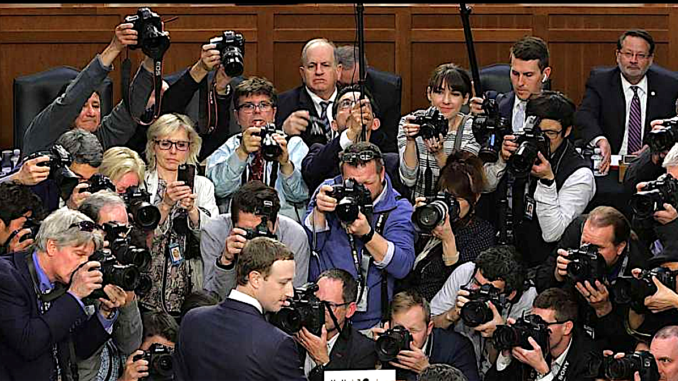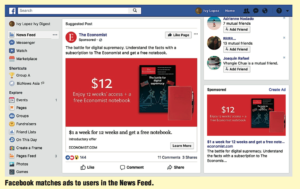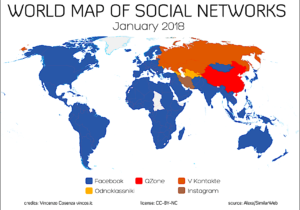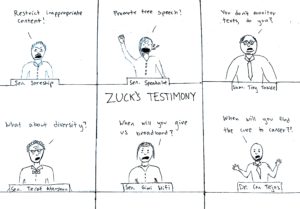
Facebook’s founder and CEO Mark Zuckerberg (MZ), 33, testified before the US Congress on April 10-11 to answer questions about the improper use of 87 million Facebook (FB) users’ data.
MZ appeared tense, as anyone would who faces two days of questioning from 99 members of congress. Instead of his iconic Silicon Valley hoodie, T-shirt, and jeans, MZ donned a suit and tie similar to every other Washington politician. What set him apart? He was the only millennial billionaire in the room.
In 2010, FB launched Open Graph API (application programming interface) that allows external developers to contact FB users and seek permission to access their personal and friends’ data like: name, gender, birthday, location, education, page, posts, and likes. Developers need this data to develop applications (apps) that seamlessly connect with FB and other sites.
In 2013, a University of Cambridge professor Aleksandr Kogan created a survey app to study online presence and personality. The 270,000 FB users who answered the survey unknowingly gave permission for Kogan to access their friends’ FB data. This access to extended users ballooned the data pool to 87m.
In 2014, FB changed API rules to limit a developer’s access to user data. Developers now need FB’s approval before they request any sensitive data from users. Likewise, a third party now needs user’s consent before they can access his friends’ data. But this change was not retroactive. So Kogan did not delete the data he collected in 2013.
Kogan later worked for a political data firm Cambridge Analytica (CA), funded by Donald Trump backers. CA was hired to help with Trump’s presidential campaign and used Kogan’s FB data to target specific voters with tailored campaign messages.
In 2015, when FB found out about CA’s use of Kogan’s data, it banned CA and Kogan’s app from FB, then ordered the two to delete the data. CA claims it did.
Yet on March 17, 2018, a CA whistleblower said that CA used Kogan’s data to build psychographic profiles to target voters during the 2016 US elections. Three days later the Federal Trade Commission launched an investigation of FB. No word from FB. During FB’s silence, its stock fell over 5% worth over $4bn.
Four days after the leak, MZ posts on his FB page that it will limit developers’ access to users’ data and audit all API developer apps who accessed data before 2014. “It is against our policies for developers to share data without people's consent.”
Eight days after the leak, FB buys seven full page ads in the US and UK to apologize for a breach of trust. “We have a responsibility to protect your information. If we can’t, we don’t deserve it.”
We own our content, but who controls it?
FB is the world’s largest online social media and networking site where its 2.1bn monthly users post their own content to share with the public or their friends. Even if just half are active, that is still over a billion monthly users.
Just like with a friend, users share with Facebook what they care about: birthdays, celebrations, achievements, vacations, houses, cars, hobbies, jobs, get-togethers, fashion, and even grief and tragedy. FB is the first to know about events in our lives and is also the first to share any news with others.
Posts are uncensored as long as it doesn’t violate FB’s Community Standards of decency and is not illegal, prohibited, dangerous, or discomfiting.
FB has become an ego preening machine where we post our best versions of ourselves. It’s the digital equivalent of our mom showing off our awards and pictures to guests. If we have nothing to brag about, there’s always our food or the scenery.
Like an intimate friend who knows us better than we know ourselves. FB stores our user behavior and data, sees our real-time online activity, and can even predict when we are sad, happy, healthy, or looking to buy. Based on what we like, share, and click, FB knows our hobbies, habits, and interests. What we like in movies, music, food, and clothes; where we shop; what we read online; how often we go on vacation; when we are sick; and even if we are gay.
MZ repeatedly told Congress that FB users own their content, quoting FB Terms of Service (Terms). “You own all of the content and information you post on Facebook, and you can control how it is shared through your privacy and application settings.”
Like a good friend entrusted with our cherished memorabilia, FB keeps all our pictures, comments, conversations, activity, and videos on its data centers around the world so that it is readily available for users who want to retrieve it anytime online in seconds.

FB maintains at least seven data centers worldwide to store user data. Each facility is 300,000 square foot (sq ft) or the size of 23 Olympic-size swimming pools. One facility is 500,000 sq ft, the same size as an Apple server farm. These sprawling centers are located where land and electricity are cheap. They are well-designed and custom-built by FB with open-air evaporative cooling to keep the non-stop hardware from overheating.
Facebook costs billions to run. Managing FB’s eternal ocean of data takes massive computing power, land, electricity, technical skills, and manpower. In 2017, FB only had a net profit of $15.9bn, out of its $40.7bn revenue.
So how is FB supposed to maintain such a tremendous system without charging its users?
Like any media, FB needs advertisers to operate. Historically, advertisers seek consumers who are interested in their products, otherwise they just waste money on ignored ads. Using the only thing it has, FB monetizes its user’s online behavior and profile by specifically targeting users who will likely be interested in a particular product.
There is a pervasive notion that FB sells our data. “We don’t sell user data,” MZ clarified. “We sell ads.”
MZ told congress that FB places ads on a user’s page that are relevant to them. So a luxury car manufacturer will pay FB to show its ads on the pages of users who have shown an interest in luxury cars, as revealed by their profile, content, shares, clicks, and likes.
FB can time it perfectly that a user will see an ad for a new car just after the user searched for one. This is meaningful advertising because FB offers a product to a consumer looking for it.
Once we publish, we give FB the right to use it
 In the first place, FB users volunteer all their personal information and posts. We fill out all the blanks and answer all the prompts. It’s easy to forget that we are talking to a machine when it seems so interested in us! FB wants to know more! So we give it more information about ourselves, because we are just so interesting, right?
In the first place, FB users volunteer all their personal information and posts. We fill out all the blanks and answer all the prompts. It’s easy to forget that we are talking to a machine when it seems so interested in us! FB wants to know more! So we give it more information about ourselves, because we are just so interesting, right?
“When you publish content or information using the Public setting, it means that you are allowing everyone, including people off of Facebook, to access and use that information, and to associate it with you (i.e., your name and profile picture).” (FB Terms)
But once you publish on FB, you give FB permission to use it. FB Terms clearly state:
“For content that is covered by intellectual property rights, like photos and videos (IP content), you specifically give us the following permission, subject to your privacy and application settings: you grant us a non-exclusive, transferable, sub-licensable, royalty-free, worldwide license to use any IP content that you post on or in connection with Facebook (IP License). [underline added]
“This IP License ends when you delete your IP content or your account unless your content has been shared with others, and they have not deleted it. When you delete IP content, it is deleted in a manner similar to emptying the recycle bin on a computer. However, you understand that removed content may persist in backup copies for a reasonable period of time (but will not be available to others).”
Every FB user automatically allows advertising with the use of our public profile. Likewise, minors on FB are presumed to have their parents’ consent.
“Our goal is to deliver advertising and other commercial or sponsored content that is valuable to our users and advertisers. In order to help us do that, you agree to the following:
“You give us permission to use your name, profile picture, content, and information in connection with commercial, sponsored, or related content (such as a brand you like) served or enhanced by us. This means, for example, that you permit a business or other entity to pay us to display your name and/or profile picture with your content or information, without any compensation to you. If you have selected a specific audience for your content or information, we will respect your choice when we use it. If you are under the age of eighteen (18), you represent that a parent or legal guardian also agrees to this section on your behalf.”
“We do not give your content or information to advertisers without your consent.”
Opening a Facebook account is like filling out an application for a mobile carrier. We give them our data and the carrier likely shares our public information with interested businesses. Credit card companies routinely sell cardholders’ data with their affiliates so they can advertise to specific income groups.
Even if we limit all our posts and shares to our circle of FB Friends, all our posts are considered published since they are made known to a third person. The breadth of exposure is not what matters, it’s the fact of sharing it with another person. As with secrets, the moment we divulge it to someone, we can expect it to be eventually revealed and we can’t really control how it will spread.
And that’s the point of Facebook. We want to share online and FB allows us to do that for free. We cannot expect much privacy when we use a network because it is necessarily interconnected and we need to leave a digital trail so we can use apps or go to other websites.
When FB shares our public profile, it seems a violation of our trust because our content is personal. But all our content came from us anyway. How important is it for us to avail of FB’s free online service versus our claim to privacy?
Outside of FB, it can still reach us online
 We need to remember that anytime we are online, our movements can be tracked and we are digitally monitored.
We need to remember that anytime we are online, our movements can be tracked and we are digitally monitored.
“Keep in mind when you install an app, you give it permission to access your public profile, which includes your name, profile pictures, username, user ID (account number), networks and any info you choose to make publicly available. You also give the app other info to personalize your experience, including your friends list, gender, age range and locale.” (FB Terms)
Every time you see the FB icon, FB Share, or Like icon, those is linked to FB’s tracking system. So your activity on that page is also seen by FB. You can also be tracked if you use FB products like Messenger and Instagram and if you download FB apps on your phone or device.
FB uses cookies to track us. “Cookies are small pieces of text used to store information on web browsers. Cookies are used to store and receive identifiers and other information on computers, phones, and other devices.” (https://www.facebook.com/policies/cookies)
“We use cookies if you have a Facebook account, use the Facebook Products, including our website and apps, or visit other websites and apps that use the Facebook Products (including the Like button or other Facebook Technologies).” (FB Terms)
But even if we are not logged into FB, FB tracks us automatically “for security purposes” to make sure those not signed in to FB cannot scrape user information. It sounds bad, but it’s similar to the security measure of watching mall shoppers who don’t really enter any shop but roam around the mall. FB tracks us to secure our accounts from spam, phishing, malware, and prohibited acts. This cannot be turned off.
FB also uses cookies to observe our online behavior to improve their service, match us with suitable ads, and measure ad performance.
Ask not what FB can do for you
 Zuckerberg should first have asked Congress how many were on FB because there were some questions that revealed ignorance about how FB works. One senator asked if FB can read and save his text messages. No, they are encrypted, MZ said. Another asked how FB makes money. “We sell ads.”
Zuckerberg should first have asked Congress how many were on FB because there were some questions that revealed ignorance about how FB works. One senator asked if FB can read and save his text messages. No, they are encrypted, MZ said. Another asked how FB makes money. “We sell ads.”
Whenever you face Congress, you face each congressman’s political agenda. MZ faced 44 senators with five minutes each the first day, and 55 committee members with four minutes each the second day. It should all have taken seven hours but it expanded to over ten hours. Congress could have done without the ass-kissing and grandstanding. It would have been more efficient to just click the LIKE button on MZ’s FB page instead of wasting time flattering him.
To milk their few minutes of fame, many Congress members asked questions unrelated to Cambridge Analytica. During the inquiry, MZ was called to answer issues on free speech, hate speech, censorship, diversity, minority hire in Silicon Valley, broadband connection in towns, children’s online use, piracy, ivory trade, opioid crisis, US-Russian arms race, and terrorism. They might as well have asked about climate change and world peace based on their expectations of what Zuckerberg should know and do. Some did not even bother to let MZ reply. They just read their statements or hurled accusations.
When you become a Goliath, people expect so much of you. Just because 2bn FB users wantonly dump their information online doesn’t mean FB is supposed to censor and regulate their posts for appropriateness and decency. FB is not our parent, it’s just the platform. It receives your content, it tries not to judge it.
Congress wants conflicting standards from FB. It expects MZ to ensure free speech yet censor inappropriate material. They want FB to offer its service free to billions worldwide but to limit its access and use of user data for advertising.
MZ said that this is an issue of balancing priorities. Users want easy access to interconnect apps while using an online service for free, but they want more privacy.
Under threat of regulation, Congress wants FB to regulate itself, its users, the public, and the nation as a whole. No single entity can even do that.
It’s ridiculous to expect MZ to police its users when Congress itself cannot do that. They want FB to ban certain businesses that Congress considers illegal. But FB is just a platform that strives to maintain high standards of decency. It cannot control nor monitor every single activity on its site. Neither can it be told who to serve. Like any business, FB reserves the right to refuse service to anyone and to ban a user.
Congress wants FB to clearly and simply inform its users of exactly how their data is used. But every product comes with a contract of adhesion, which means the company drafted the terms in its favor to protect itself from undesirable users. Consumers who want to use the product have to abide by its terms. It’s like joining any association, your membership binds you to its rules.
“We always appreciate your feedback or other suggestions about Facebook, but you understand that we may use your feedback or suggestions without any obligation to compensate you for them (just as you have no obligation to offer them).” (FB Terms)
FB’s Terms of Service are clearly stated in ordinary language on its site for anyone to read, which is a far cry from Congress’ jargon-laden laws.
But who bothers? Just because a user is unaware of a condition of use doesn’t mean he isn’t bound by it. Ignorance of the law excuses no one. If a user doesn’t want to be bound by FB’s Terms of Service, then don’t use Facebook.
As to being monitored online, that’s the nature of digital activity. It’s industry standard to keep track of users online. All tech companies do it—Google, Apple, Amazon, Netflix—it’s how they improve their service and promote their business.
Many FB users act like unsupervised children who can move undetected online. Sharing with a device instead of with a live human makes it easy to forget that our cyber actions have consequences. Years later, that drunken college party doesn’t look so polished when you are looking for a corporate job. That’s why potential employees routinely do a search online before they hire a candidate. So stop posting content that may potentially look embarrassing to your boss and co-workers.
FB posts are stored in perpetuity. Even if we delete it from our own FB page, we cannot delete it from other users’ pages nor from other sites where it has been shared. Just like photos, we can rip up our originals and throw it away but we cannot destroy copies we have given away to loved ones.
When we regret an error online, say by downloading many apps we don’t understand or inappropriately oversharing, we cannot blame FB for not being vigilant. We need to consider every action we make online and conduct ourselves properly as we do in public. A platform cannot be blamed for our indiscretions.
You need to remember that “you have the right to remain silent” because “anything you say or do” online “can be used against you”.
Everything is voluntary for both digital provider and user. But FB owns the platform, and as the owner, he controls it. Digital ownership no longer equates with absolute control. Many refuse to accept this revamped reality and cling to the old notions of traditional ownership and absolute privacy.
If you want privacy in the Digital Age, then don’t use any device, avoid the internet, and only pay in cash. Good luck.
IVY DIGEST

Ivy Digest serves the busy reader and extracts relevant data from chosen worthwhile publications to incite ideas and inform decisions. The author Ivy is a lawyer and journalist who studied in the Ateneo de Manila University and the University of Pennsylvania’s Wharton School.

